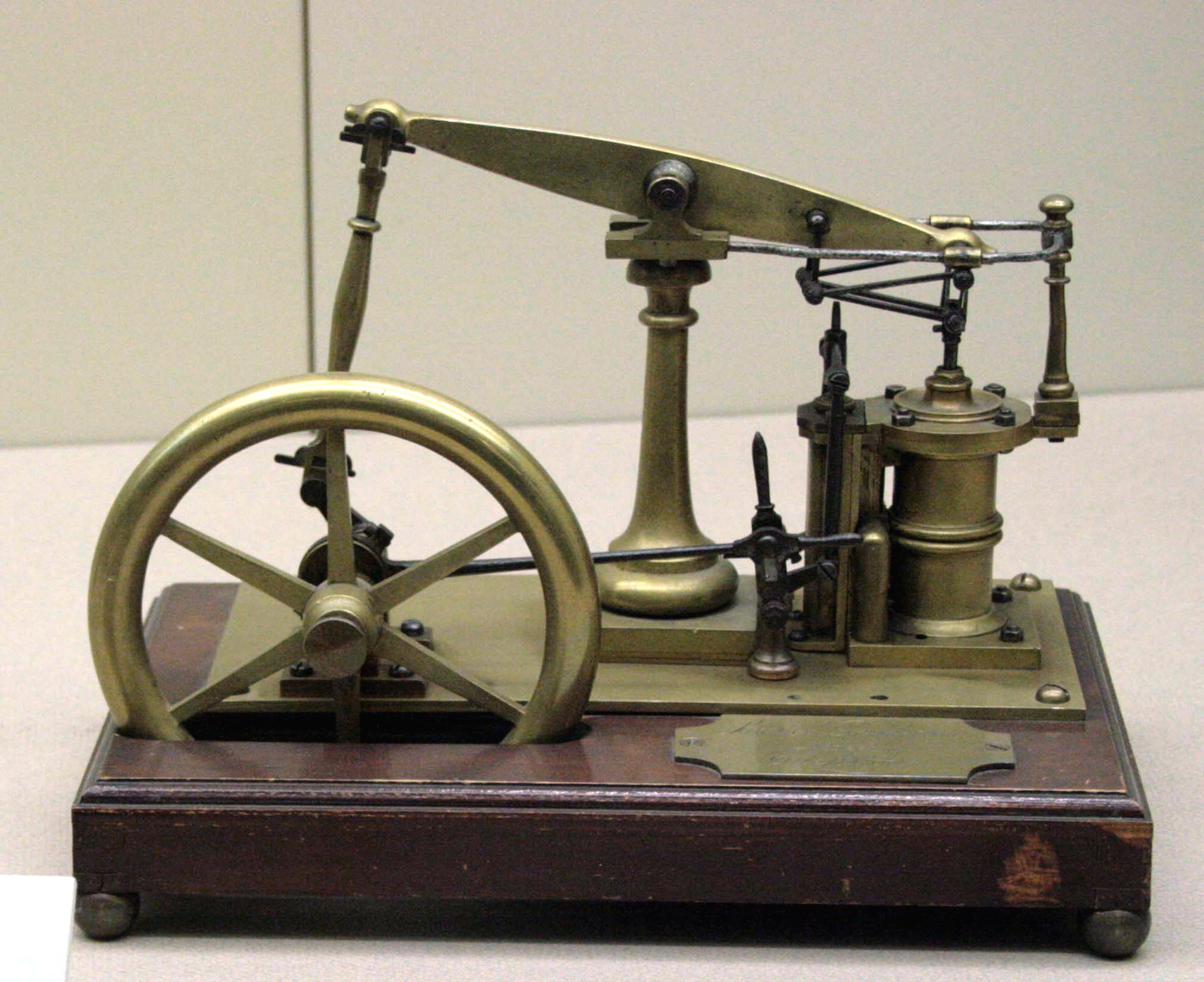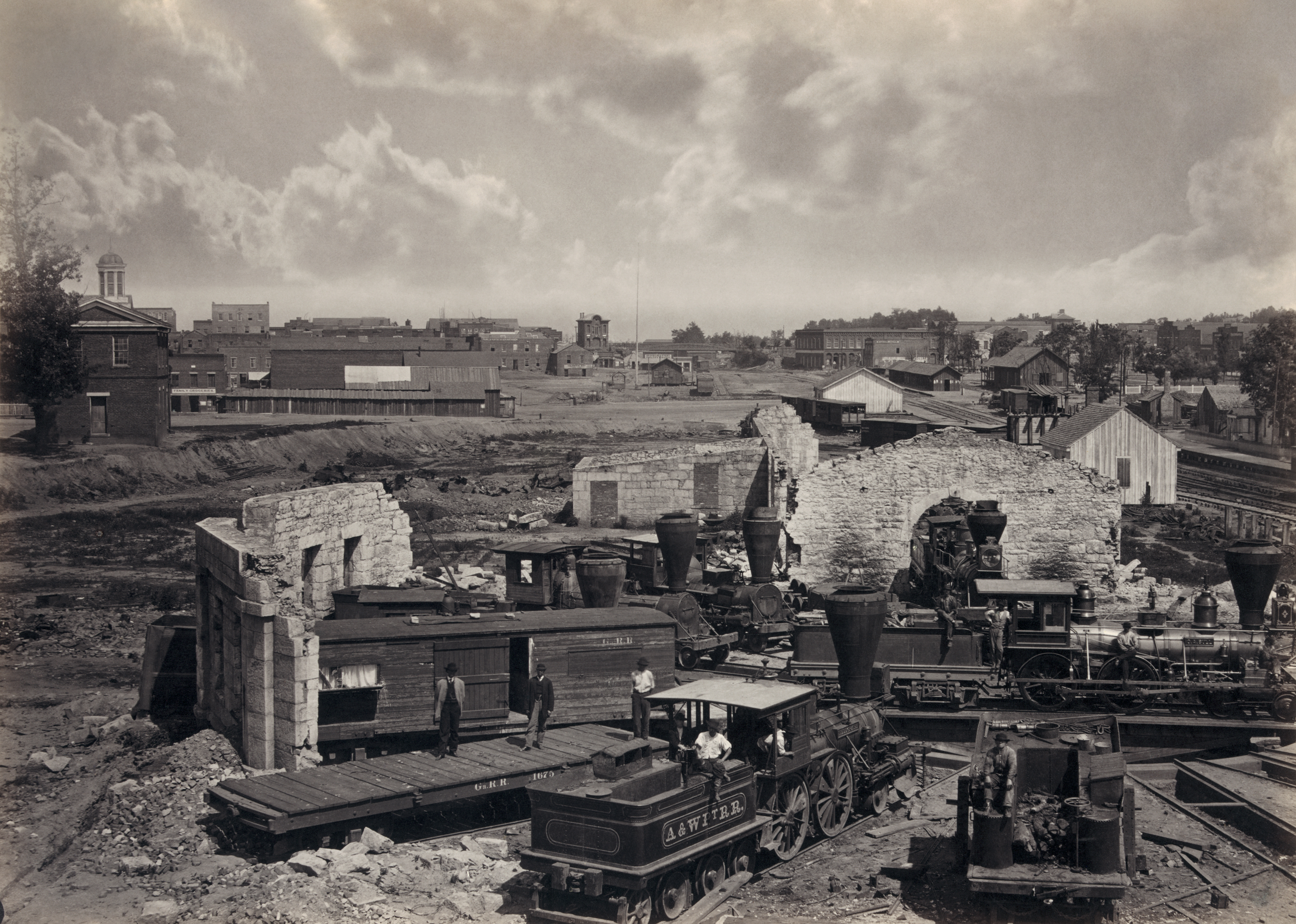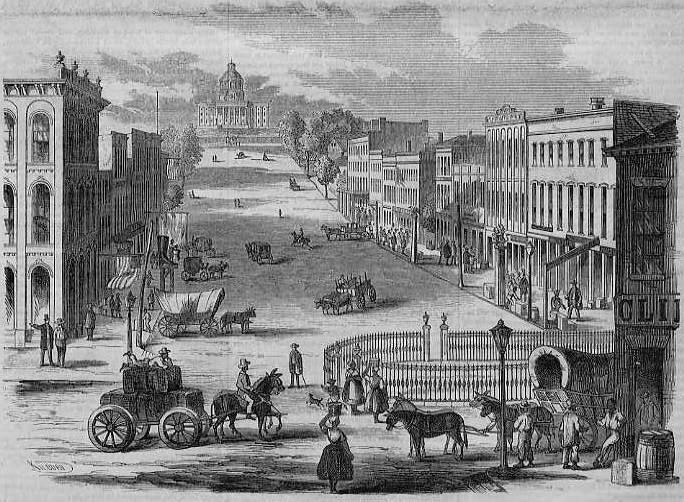|
Richard Peters (Atlanta)
Richard Peters (November 10, 1810 – February 6, 1889) was an American railroad man and a founder of Atlanta, Georgia, in the 1840s. Early life Peters was born on November 10, 1810, near Philadelphia at Germantown, Pennsylvania. He was the son of Ralph Peters (1777–1842) and Catherine (Conyngham) Peters (1786–1839). His paternal grandfather was Judge Richard Peters Jr. (an associate of George Washington). Career The young Peters was educated in Philadelphia. He worked with the architect William Strickland and as a rodman (surveyor) with John Edgar Thomson for $1.50 a day. Thomson liked the 26-year-old's work and in late 1834 offered him a job as chief engineer for $1,000 a year to help with construction of the new Georgia Railroad. Peters paid $100 for a rough paddlewheeler trip into camp near Charleston, South Carolina, in the brutally cold February 1835. He worked on the state railroad for the eight years it took to complete it from Augusta, to the new town of Mart ... [...More Info...] [...Related Items...] OR: [Wikipedia] [Google] [Baidu] |
Germantown, Philadelphia, Pennsylvania
Germantown ( Pennsylvania Dutch: ''Deitscheschteddel'') is an area in Northwest Philadelphia. Founded by German, Quaker, and Mennonite families in 1683 as an independent borough, it was absorbed into Philadelphia in 1854. The area, which is about six miles northwest from the city center, now consists of two neighborhoods: 'Germantown' and 'East Germantown'. Germantown has played a significant role in American history; it was the birthplace of the American antislavery movement, the site of a Revolutionary War battle, the temporary residence of George Washington, the location of the first bank of the United States, and the residence of many notable politicians, scholars, artists, and social activists. Today the area remains rich in historic sites and buildings from the colonial era, some of which are open to the public. Boundaries Germantown stretches for about two miles along Germantown Avenue northwest from Windrim and Roberts Avenues. Germantown has been consistently boun ... [...More Info...] [...Related Items...] OR: [Wikipedia] [Google] [Baidu] |
Lemuel Grant
Lemuel Pratt Grant (1817–1893) was an American engineer and businessman. He was Atlanta's quintessential railroad man as well as a major landowner and civic leader. In railroads he served as a laborer, chief engineer, speculator and executive all over Southern United States, the South. As part of his speculation, he owned enormous tracts of land in strategic areas. For example, at one point he owned more than in what is now Atlanta. He designed and built Atlanta's defenses during the American Civil War and afterwards became an important civic leader: donating the land for Grant Park (Atlanta), Grant Park, Atlanta's first large park, and serving as councilman and on various boards and committees. Lemuel P. Grant Mansion, His mansion is one of only four remaining original History of the Southern United States#Antebellum Era (1781–1860), antebellum houses in the city of Atlanta. Early career Lemuel Pratt Grant was born at Frankfort, Maine, on August 11, 1817. He grew up on a ... [...More Info...] [...Related Items...] OR: [Wikipedia] [Google] [Baidu] |
Battle Of Atlanta
The Battle of Atlanta was a battle of the Atlanta Campaign fought during the American Civil War on July 22, 1864, just southeast of Atlanta, Georgia. Continuing their summer campaign to seize the important rail and supply hub of Atlanta, Union forces commanded by William Tecumseh Sherman overwhelmed and defeated Confederate forces defending the city under John Bell Hood. Union Maj. Gen. James B. McPherson was killed during the battle, the second-highest-ranking Union officer killed in action during the war. Despite the implication of finality in its name, the battle occurred midway through the campaign, and the city did not fall until September 2, 1864, after a Union siege and various attempts to seize railroads and supply lines leading to Atlanta. After taking the city, Sherman's troops headed south-southeastward toward Milledgeville, the state capital, and on to Savannah with the March to the Sea. The fall of Atlanta was especially noteworthy for its political ramificati ... [...More Info...] [...Related Items...] OR: [Wikipedia] [Google] [Baidu] |
William Tecumseh Sherman
William Tecumseh Sherman ( ; February 8, 1820February 14, 1891) was an American soldier, businessman, educator, and author. He served as a general in the Union Army during the American Civil War (1861–1865), achieving recognition for his command of military strategy as well as criticism for the harshness of the scorched-earth policies that he implemented against the Confederate States. British military theorist and historian B. H. Liddell Hart declared that Sherman was "the first modern general". Born in Ohio into a politically prominent family, Sherman graduated in 1840 from the United States Military Academy at West Point. He interrupted his military career in 1853 to pursue private business ventures, without much success. In 1859, he became superintendent of the Louisiana State Seminary of Learning & Military Academy (now Louisiana State University), a position from which he resigned when Louisiana seceded from the Union. Sherman commanded a brigade of volunteers at ... [...More Info...] [...Related Items...] OR: [Wikipedia] [Google] [Baidu] |
American Civil War
The American Civil War (April 12, 1861 – May 26, 1865; also known by other names) was a civil war in the United States. It was fought between the Union ("the North") and the Confederacy ("the South"), the latter formed by states that had seceded. The central cause of the war was the dispute over whether slavery would be permitted to expand into the western territories, leading to more slave states, or be prevented from doing so, which was widely believed would place slavery on a course of ultimate extinction. Decades of political controversy over slavery were brought to a head by the victory in the 1860 U.S. presidential election of Abraham Lincoln, who opposed slavery's expansion into the west. An initial seven southern slave states responded to Lincoln's victory by seceding from the United States and, in 1861, forming the Confederacy. The Confederacy seized U.S. forts and other federal assets within their borders. Led by Confederate President Jefferson Davis, ... [...More Info...] [...Related Items...] OR: [Wikipedia] [Google] [Baidu] |
Crenshaw Company
The Crenshaw Company was a blockade running company established during the American Civil War. The company was founded by the brothers James and William Crenshaw of Richmond, Virginia. They had numerous steamers built on behalf of the confederacy to run supplies between Bermuda, Nassau, England, and Wilmington, North Carolina. James was the agent in Nassau, and William the agent in Liverpool. In early 1864, they contracted with Atlantans Richard Peters and Vernon Stevenson, and Richard Wilson to move cotton from the interior to the best remaining Confederate port at that time, Wilmington. Wilson negotiated sales to England for return cargoes of beef, pork and coffee as well as materials for the assembly of cotton bales (iron hoops and gunny cloth). During that time, the Captains were Englishman George M. Horner and Michael Philip Usina of Savannah and two steamers: ''Marie Celeste'' and ''Atlanta''. First voyage was Usina on the new sidewheeler ''Marie Celeste'' from Wilm ... [...More Info...] [...Related Items...] OR: [Wikipedia] [Google] [Baidu] |
Blockade Running
A blockade runner is a merchant vessel used for evading a naval blockade of a port or strait. It is usually light and fast, using stealth and speed rather than confronting the blockaders in order to break the blockade. Blockade runners usually transport cargo, for example bringing food or arms to a blockaded city. They have also carried mail in an attempt to communicate with the outside world. Blockade runners are often the fastest ships available, and come lightly armed and armored. Their operations are quite risky since blockading fleets would not hesitate to fire on them. However, the potential profits (economically or militarily) from a successful blockade run are tremendous, so blockade-runners typically had excellent crews. Although having ''modus operandi'' similar to that of smugglers, blockade-runners are often operated by state's navies as part of the regular fleet, and states having operated them include the Confederate States of America during the American Civil W ... [...More Info...] [...Related Items...] OR: [Wikipedia] [Google] [Baidu] |
Confederate Powderworks
The Confederate Powderworks (a.k.a. the Augusta Powderworks) was a gunpowder factory during the American Civil War, the only permanent structures completed by the Confederate States of America.Bragg, C. L. (2001) "The Augusta powder works: The Confederacy's manufacturing triumph", ''American Rifleman'' 149(5), pp 58. Colonel George Washington Rains chose the old United States Arsenal site between the Canal and Savannah River in Augusta, Georgia, as a secure inland location with good rail and water connections. History Rains graduated from West Point with the class of 1842 and served as a chemistry teacher for the Military Academy. He had resigned to become president of an iron works in Newburgh, New York. At the start of the Civil War he chose allegiance to his native North Carolina and returned to the south. He was placed in charge of the Gunpowder and Niter Bureau by Jefferson Davis the president of the Confederacy. Construction began in September 1861, a 130 hp steam en ... [...More Info...] [...Related Items...] OR: [Wikipedia] [Google] [Baidu] |
Steam Engine
A steam engine is a heat engine that performs mechanical work using steam as its working fluid. The steam engine uses the force produced by steam pressure to push a piston back and forth inside a cylinder. This pushing force can be transformed, by a connecting rod and crank, into rotational force for work. The term "steam engine" is generally applied only to reciprocating engines as just described, not to the steam turbine. Steam engines are external combustion engines, where the working fluid is separated from the combustion products. The ideal thermodynamic cycle used to analyze this process is called the Rankine cycle. In general usage, the term ''steam engine'' can refer to either complete steam plants (including boilers etc.), such as railway steam locomotives and portable engines, or may refer to the piston or turbine machinery alone, as in the beam engine and stationary steam engine. Although steam-driven devices were known as early as the aeolipile in the f ... [...More Info...] [...Related Items...] OR: [Wikipedia] [Google] [Baidu] |
Atlanta & West Point Railroad
The Atlanta and West Point Rail Road was a railroad in the U.S. state of Georgia, forming the east portion of the Atlanta-Selma West Point Route. The company was chartered in 1847 as the Atlanta and LaGrange Rail Road and renamed in 1857; construction of the gauge line was begun in 1849-50 and completed in May 1854. A large minority interest owned by the Georgia Railroad and Banking Company eventually passed under the control of the Atlantic Coast Line Railroad (ACL), which later acquired a majority of the stock. In the late 20th century restructuring, through the Seaboard Coast Line Railroad (SCL), successor to the ACL, the A&WP came under the Family Lines System banner in 1972. Years later in June 1983, it was merged into the Seaboard System Railroad, successor to the SCL. The former A&WP property is now owned by CSX Transportation. In 1967 A&WP reported 232 million revenue ton-miles of freight and 3 million passenger-miles on of road operated. History The AWP and the Weste ... [...More Info...] [...Related Items...] OR: [Wikipedia] [Google] [Baidu] |
Montgomery, Alabama
Montgomery is the capital city of the U.S. state of Alabama and the county seat of Montgomery County. Named for the Irish soldier Richard Montgomery, it stands beside the Alabama River, on the coastal Plain of the Gulf of Mexico. In the 2020 census, Montgomery's population was 200,603. It is the second most populous city in Alabama, after Huntsville, and is the 119th most populous in the United States. The Montgomery Metropolitan Statistical Area's population in 2020 was 386,047; it is the fourth largest in the state and 142nd among United States metropolitan areas. The city was incorporated in 1819 as a merger of two towns situated along the Alabama River. It became the state capital in 1846, representing the shift of power to the south-central area of Alabama with the growth of cotton as a commodity crop of the Black Belt and the rise of Mobile as a mercantile port on the Gulf Coast. In February 1861, Montgomery was chosen the first capital of the Confederate States of ... [...More Info...] [...Related Items...] OR: [Wikipedia] [Google] [Baidu] |
Stage Coach
A stagecoach is a four-wheeled public transport coach used to carry paying passengers and light packages on journeys long enough to need a change of horses. It is strongly sprung and generally drawn by four horses although some versions are drawn by six horses. Commonly used before steam-powered rail transport was available, a stagecoach made long scheduled trips using ''stage stations'' or posts where the stagecoach's horses would be replaced by fresh horses. The business of running stagecoaches or the act of journeying in them was known as staging. Some familiar images of the stagecoach are that of a Royal Mail coach passing through a turnpike gate, a Dickensian passenger coach covered in snow pulling up at a coaching inn, a highwayman demanding a coach to "stand and deliver" and a Wells Fargo stagecoach arriving at or leaving a Wild West town. The yard of ale drinking glass is associated by legend with stagecoach drivers, though it was mainly used for drinking feats and ... [...More Info...] [...Related Items...] OR: [Wikipedia] [Google] [Baidu] |








.jpg)